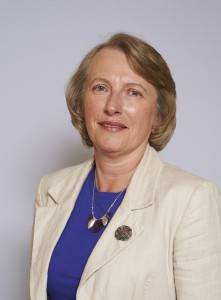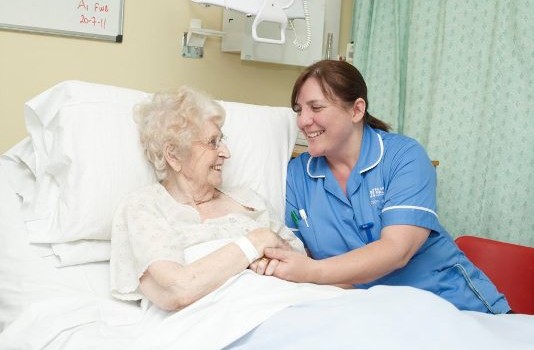The next local event to help gain patient feedback around diabetes services in Solihull has been announced.
Organised by Heart of England NHS Foundation Trust, Solihull Metropolitan Borough Council and Solihull Clinical Commissioning Group, the event will take place at The Fordbridge Centre, Nineacres Drive, on Wednesday 9 April. Two free sessions are available for local residents to attend, from 2-4pm and 6-8pm.
The patient engagement event, which is being facilitated by Diabetes UK, provides a unique opportunity to ask questions, offer feedback on the current diabetes services available and put forward any suggestions about how diabetes care could be improved.
Julia Gilroy, lead nurse diabetes specialist and manager of Solihull Community Diabetes Service, said: “All locals who have been affected by diabetes are welcome to attend and feed back on how they believe diabetes care in Solihull can be improved. For example, as part of the feedback we received at our previous patient engagement event, we are reviewing our patient education programme. These engagement events are really valuable for ensuring we are meeting the needs of our patients in the most effective and efficient way possible.”
Light refreshments will be served and free car parking is also available on-site.
For more information, call Solihull Community Diabetes Service on 0121 770 4432.
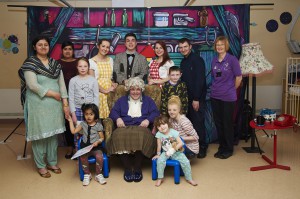 Children at Heartlands Hospital have been treated to a special storytelling performance from Starlight Children’s Foundation, helping to bring a big dose of fun and laughter to young patients.
Children at Heartlands Hospital have been treated to a special storytelling performance from Starlight Children’s Foundation, helping to bring a big dose of fun and laughter to young patients.
Four actors sang and danced along to a narrated collection of well-loved children’s stories for the young audience. The performance included family favourites such as The Princess and the Pea, Charlotte’s Web and Three Little Pigs.
The Starlight Storytellers tour, which will visit 50 hospitals and hospices across the country, has been funded by Heinz’s ‘Get Well’ Soup campaign, which ran in January and February this year. The campaign asked the public to purchase personalised cans of ‘Get Well’ soup for loved ones feeling under the weather.
Christine Morrell, health play specialist at Heartlands Hospital, said: “We use play to help distract poorly children from the pain and anxiety that they might be feeling as a result of their illness and there’s nothing quite like a good story to capture a child’s imagination. We are very grateful to Starlight Storytellers for providing the opportunity for our children to enjoy this special treat. All the children loved it.”
Neil Swan, chief executive of Starlight Children’s Foundation, explained: “For many children a trip to hospital can be very scary and Starlight aims to provide services that will entertain and distract young patients during their stay. We are delighted to partner with Heinz for a second year on its ‘Get Well’ Soup campaign and very pleased that the Starlight Storytellers visit brought some wonderful stories to life for the children.”
Miscommunication and misunderstandings are sometimes reasons why patients stay longer in hospital.
To address this, Heart of England NHS Foundation Trust has been working alongside Community Services and external agencies to run the ‘Breaking Barriers for Patients’ project.
Launched last week, the seven day initiative focused on patient discharge and the more effective use of community care outside of the hospital setting.
Whilst running the ‘Breaking Barriers for Patients’ initiative, the Trust was supported by the local Councils, Community Trusts and partner agencies, as well as the whole health economy to see how we could work even better together and improve our patient experience further. We identified key areas of problem solving in relation to complex discharges, length of stay and admission reviews.
By using new systems and processes, we have worked hard to improve and maintain our patient flow through our Hospitals. The SAFER bundle is one of the new systems which have been introduced by the Trust enabling teams to provide safe and timely care for patients. The bundle has been embedded into our daily clinical routines.
S – Senior Review. All patients will have a consultant review before 10am followed by a ward or board round.
A – All patients will have a planned discharge date set (that patients are made aware of) based on the medically suitable for discharge status agreed by the clinical teams.
F – Flow of patients will commence at the earliest opportunity from assessment units (AMU & SAU) to inpatient wards.
E – Early discharge. 50 percent of our patients will be discharged from inpatient wards before midday.
R – Review. A weekly systematic review of patients with extended lengths of stay to identify the issues and actions required to facilitate discharge. This will be led by senior leaders within the Trust.
Bronze, silver and gold commands were on hand to support teams in dealing with issues as they came about. Bronze (ward liaison officers) liaised with ward staff on the wards to remove obstacles to care and smooth systems. Silver (site management teams for each of the Trust’s hospitals) gathered information from the wards. Gold (Trust’s executive director) then met with the site management teams twice a day to review the information collected by the silver commands.
Following the success of the ‘Breaking Barriers for Patients’ initiative at the Trust, we will continue to work closely with Community Services and external agencies to provide safe and timely care for patients and further improve our patients’ experiences with us.
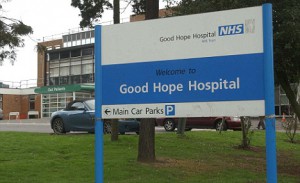 An innovative partnership between Good Hope Hospital and Birmingham City Council is giving patients with a wide range of lung conditions the opportunity to take part in a choice of free activities to help ease and manage their condition once they leave Hospital.
An innovative partnership between Good Hope Hospital and Birmingham City Council is giving patients with a wide range of lung conditions the opportunity to take part in a choice of free activities to help ease and manage their condition once they leave Hospital.
A weekly exercise session is now offered to patients at Wyndley Leisure Centre in Sutton Coldfield, after their hospital rehabilitation programme has been completed.
Physical inactivity is common amongst patients with chronic lung diseases, which can often lead to muscle de-conditioning and an increased risk of developing chest infections. The new sessions will offer patients help and support to exercise and improve their quality of life.
Stuart Lightfoot, respiratory physiotherapy outpatient lead, said: “Having a chronic respiratory illness can be very isolating, with symptoms varying day to day affected by a multitude of factors.
“Working together with the professional fitness instructors based at the leisure centre, the classes are helping to make people feel healthier and manage their conditions more effectively.
“Besides its therapeutic benefits, the course also allows patients to socialise, share experiences and make new friends.”
Living with a lung condition, Alan Cuzick, aged 53 from Redditch said: “Going to the class is an incentive to make the effort to get out and meet people. A bit of exercise also helps me to get out and keep moving. I enjoy it.”
The sessions at Wyndley Leisure Centre are currently free to participants under Birmingham City Council’s ‘Be-Active’ scheme.
If you have a respiratory problem and feel you would benefit from the pulmonary rehabilitation programme, please discuss a referral to the respiratory physiotherapy outpatient team with your GP.
1) Do you have sperm stored posthumously? If so for how many patients?
2) Do you have embryos stored created from sperm from a deceased donor? If so for how many patients?
3) How many women have had posthumous IVF treatment in the past year?
4) How many women have conceived through posthumous IVF in the past year?
5) How many babies have been born through posthumous IVF in the past 10 years?
HEFT does not store embryos or sperm and does not carry out IVF. Any patients approaching us for this service would be referred to suitable providers.
- We calculate 311 patients are unaccounted from your Dispatches response in the breakdown of numbers from the 1079 – what is the situation with these.
- How many patients have undergone further treatment in the light of the full recall?
A review of all NHS patients believed to have had a mastectomy under the care of Mr Paterson gave a total of approximately 1079 patients. At the time of the recall 643 of the 1079 patients originally identified, were alive. Of the 643 patients, all of whom were invited to a recall clinic, 553 attended a recall clinic. To date 74 patients have had surgical intervention to remove residual tissue/deconstruct reconstructed breast. The recall finished in January 2012. We are currently doing a full review and, as we work through this, the data is changing. We continue to keep the progress of our patients going through this process, under careful review.
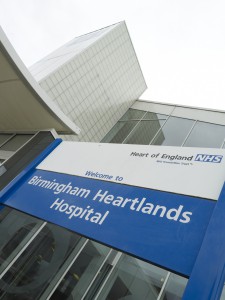 Stroke survivors and staff at Heartlands Hospital have helped pave the way forward for care of stroke patients through their part in a major regional research project.
Stroke survivors and staff at Heartlands Hospital have helped pave the way forward for care of stroke patients through their part in a major regional research project.
With almost 12,000 people across the West Midlands suffering from a stroke each year, this major health problem requires quick diagnosis and treatment to improve the prospects of recovery. Patients, nurses, doctors and other members of staff from Heartlands and other local healthcare providers contributed to the Collaborations for Leadership in Applied Health Research and Care (CLAHRC) project to improve stroke health services.
As a result of the University of Birmingham five-year study, a new way for ambulance crews to record the onset of stroke has been introduced. The FAST test (Facial weakness, Arm weakness, Speech problems, Time to call 999) used to identify the onset of a stroke, has been adapted for paramedics so the ‘T’ now stands for ‘time of onset’. This means vital information isn’t lost which aids speedier treatment.
The researchers have also developed educational board games called: ‘strokes and ladders’ and ‘FASTest Route’ to promote public understanding of stroke signs and symptoms and the importance of calling the emergency services.
These games are now being taken to local family and community events.
The five year study looked at every aspect of the patient journey from the onset of symptoms, through diagnosis and treatment in hospital, to the quality of aftercare and support.
Heartlands Hospital’s elderly medicine consultant, Dr David Sandler, said: “This was a collaborative effort between Heartlands Hospital, the University of Birmingham and other partners. The results in action have helped us pull together our emergency stroke pathways allowing stroke patients to access investigations and treatment sooner. We are proud to have been a major part of this research.”
Dr Ruth Mellor, CLAHRC stroke manager and research fellow, said: “I’d like to thank everyone who took part in this study. We’ve worked together with healthcare professionals across the NHS, but we couldn’t have done this without the contribution from patients and staff at Heartlands Hospital.”
To see the research summary and to view the ‘strokes and ladders’ and ‘FASTest Route’ educational games, go to: http://www.clahrc-bbc.nihr.ac.uk/documents/Th7_LaySummary.pdf
The number of patients in your Trust diagnosed with breast cancer (also from 01/09/2012 – 30/11/2012).
In response to FOI – 2939 (question 1), please find below the number of patients diagnosed with breast cancer between September and November 2012. The activity is based on patients who had C50*, malignant neoplasm as either their primary or secondary diagnoses.
| Month |
Sep-12 |
Oct-12 |
Nov-12 |
Grand Total |
| Activity |
311 |
347 |
345 |
1,003 |
The number of new referrals for breast cancer patients to see a psychologist (from 01/09/2012 – 30/11/2012), What was the typical time a patient with breast cancer had to wait to be seen by a Clinical Psychologist in 2012? (up to 1 week, 1-2 weeks, 2-4 weeks, 4-8 weeks, more than 8 weeks)
Breast Cancer Referrals September to November 2012 and average waiting times in days
| Month | September | October | November | Total: |
|
Heartlands/Solihull (cover: 5 sessions) |
1 |
3 |
1 |
5 |
|
Average wait: |
86 |
40 |
2 |
41 |
|
Good Hope (cover: 2 sessions) |
4 |
4 |
3 |
11 |
|
Average wait: |
22 |
12 |
20 |
18 |
|
Total for HEFT (cover: 7 sessions) |
5 |
7 |
4 |
16 |
|
Average wait: |
54 |
26 |
11 |
29.5 |
The 86 day waiting time is an exception, and caused by difficulties in reaching the patient involved (there was no response to several messages and letters and eventually she was discharged). Over these three months there were on average 14 new referrals per month (42 over this time span) from various cancer sites (36 outpatients, 5 inpatients) with a distribution ratio of 2 Heartlands/Solihull referrals for every Good Hope referral. We are really contracted to see 6 new referrals per month (18 over this time span), hence the long waiting times which occasionally breach our 30 day limit.
How many WTE Clinical Psychologists worked in the Cancer Unit in 2012?
There are currently two Psychologists working in the cancer unit. One doctor offers 1 day a week (2 sessions) at Good Hope Hospital and the other offers 2.5 days (5 sessions) in the cancer psychology service at Heartlands Hospital where he also sees patients referred by Solihull Hospital.
Additional Information
Breast cancer represented 38% of all cancer referrals over that period:
| Head/Neck: | 1 | (2%) |
| Breast: | 16 | (38%) |
| Upper GI: | 3 | (7%) |
| Lung: | 1 | (2%) |
| Liver: | 0 | (0%) |
| RenaI: | 0 | (0%) |
| Endocrine: | 1 | (2%) |
| Lower GI: | 4 | (9%) |
| Gynea-Oncology: | 0 | (0%) |
| Prostate: | 1 | (2%) |
| Testicular: | 0 | (0%) |
| Urology: | 1 | (2%) |
| Haematology: | 0 | (0%) |
| Bone: | 0 | (0%) |
| Skin: | 0 | (0%) |
| Other: | 3 | (7%) |
Metastatic prostate cancer (that has spread from the prostate to other parts of the body, also ‘advanced’ prostate cancer, castrate resistant, hormone relapsed)
| Therapy | Abiraterone (Zytiga) | Cabazitaxel (Jevtana) | Docetaxel (Taxotere) | Enzalutamide (Xtandi) | Radium-223 (Xofigo) | Others |
| Patients | 41 | 8 | 43 | 10 | 0 | 0 |
If known, how many of the patients treated with Abiraterone, have previously been treated with Docetaxel? 2
Hepatocellular Carcinoma (HCC) (Primary cancer of the liver)
| Therapy | Bevacizumab (Avastin) | Everolimus (Afinitor) | Lapatinib (Tyverb) | Sorafenib (Nexavar) | Sunitinib (Sutent) | Others |
| Patients | 0 | 0 | 0 | 6 | 0 | 12 TACE |
Medullary thyroid cancer (MTC) (including multiple endocrine neoplasia type 2 (MEN2) when the carcinoma is within the parathyroid gland and medullary component of the adrenal glands)
We do not treat Medullary thyroid cancer at this trust.
| Therapy | Axitinib (Inlyta) | Cabozantinib (Cometriq) | Pazopanib (Votrient) | Sunitinib (Sutent) | Vandetanib (Caprelsa) | Others |
| Patients | 0 | 0 | 0 | 0 | 0 | 0 |
Gastrointestinal Stromal Tumours (GISTs) (GISTs including the stomach or small bowel, and anywhere along the length of the digestive tract)
| Therapy | Dasatinib (Sprycel) | Imatinib (Glivec) | Nilotinib (Tasigna) | Pazopanib (Votrient) | Regorafenib (Stivarga) | Sorafenib (Nexavar) | Sunitinib (Sutent) | Others |
| Patients | 0 | 5 | 0 | 0 | 0 | 0 | 0 | 0 |
A granular organisational chart for the full management structure including names for; Attached.
– The whole IT / ICT / IM&T Department (Including Information, Performance, Business Intelligence, Clinical Development, Clinical
Systems, Software Development Team / Applications Team and Finance Department) within your organisation
A list of the Software and clinical systems used within the trust – Attached
A list of upcoming IT / ICT / IM&T projects ICT projects – LAN / WAN and Voice refresh these are the only two up and coming ICT projects.
Exec Structure Heartlands Mar 2014 04.

